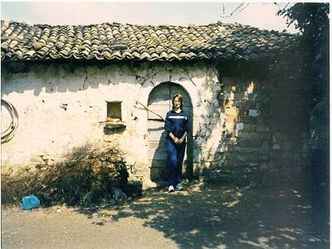 CHRISTINE CONFRONTS HER PAST “Aunt Dimitra, who had again transformed into a sweet, elderly lady with saggy breasts and grey bun, grinned at her and walked over to a building that was old and small and covered in hay and dirt. It was not more than two metres in height, and the whitewashed walls were crumbling, revealing old bricks of different shades and stones that had been haphazardly put together many years ago. Christine was intrigued by this small building. She wandered around its remains, ogling its decrepit wooden door, dirty white walls, jagged brown tiled roof, and crumbling façade. The building stood in the radiant sun, a memorial to the poverty of her forefathers. ‘This is where your mum was born, and this is where she was brought up,’ her aunt said, beaming with pride and excitement. Christine stared wide-eyed at the ‘house’, and was dismayed by the poverty of the place. She went closer and peeked through a miniature window smeared with dirt. She imagined her mother getting dressed and preparing herself for the day ahead. The house was tiny both in width and in height—the doorway barely allowing children to walk through. There were no rooms—indeed, the ‘house’ itself was the size of a room. Christine tried to imagine her mum as a small girl growing up into a young woman in such unbearable surroundings—and with all her brothers and sisters in such close range. The thought suffocated Christine, who valued her space, her freedom. ‘And this is the kitchen—and where Grandma and Grandpa slept.’ Her aunt stood in front of a rundown red brick house that stood opposite, its white paint completely peeled away—the home of her grandmother and grandfather. Christine could not grasp the wretched poverty of her forefathers, and walked into the small house. It had enough room for the oven and a bed. The house now covered in black soot, Christine tried to discern where and how her grandparents had spent the night. She spied a small space in the corner of dirt and hay and came to the realisation that it was from that spot that her mother had come into existence. Her thoughts went to her grandma, with her short round body, her round face and round eyes—laughing crudely yet joyously—and beyond that to her foremothers, slaving away at the little stone oven on a hot day like today, baking the life-giving bread that had sustained peasants for centuries. Cooking the lentil soup and preparing the olives that made the Mediterranean diet famous for its nutritious, life-nourishing qualities. The entire lot and the buildings had been abandoned years ago and left to disintegrate forever; corpses to be buried and forgotten; a cursed reminder of peasant drudgery and the dehumanisation that is poverty. ‘I don’t know what to say, Aunty. So much poverty . . . I can’t believe it . . .’ (Yet) as long as people remained in the village, as long as her ancestors came back to pay homage, the old house of the Giannopoulos family would stand—because once it fell, the village would be gone physically, culturally and spiritually. And nothing would be left to tell of their stories.” (Excerpt: Daughter of Odysseus - Ithaka Calling, Part 3, Chapter 11)
0 Comments
Leave a Reply. |
To find out more about me, go to 'About'. You can also follow me on Facebook: Archives
December 2022
Categories |

 RSS Feed
RSS Feed